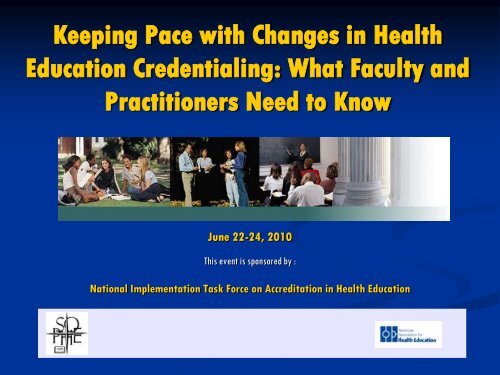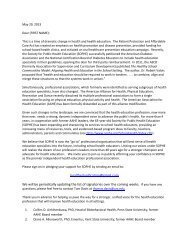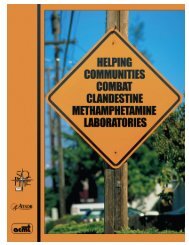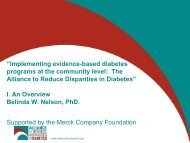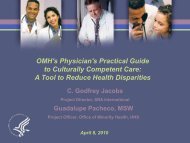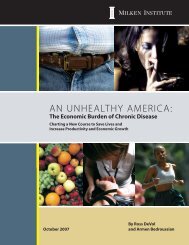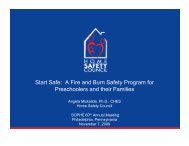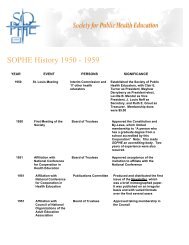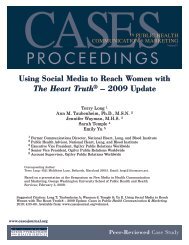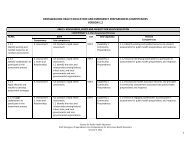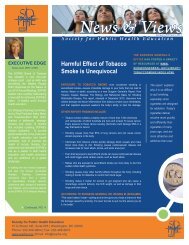Presentation slides - Society for Public Health Education
Presentation slides - Society for Public Health Education
Presentation slides - Society for Public Health Education
You also want an ePaper? Increase the reach of your titles
YUMPU automatically turns print PDFs into web optimized ePapers that Google loves.
Keeping Pace with Changes in <strong>Health</strong><br />
<strong>Education</strong> Credentialing: What Faculty and<br />
Practitioners Need to Know<br />
June 22-24, 2010<br />
This event is sponsored by :<br />
National Implementation Task Force on Accreditation in <strong>Health</strong> <strong>Education</strong>
Technical Support<br />
• E-mail: support@webex.com<br />
• Phone: Call 1-866-229-3239 (U.S. and Canada toll-free)<br />
• Both WebEx and Teleconference are in use
Questions?<br />
• All participants, except the host and panelists, are muted.<br />
• There will be a Q&A session after the presentations.<br />
• Questions may be submitted any time during the event by<br />
clicking on the ? button on your toolbar and typing in your<br />
question.
Feedback<br />
• Feedback from webinar attendees is important and encouraged<br />
• Please complete the brief feedback <strong>for</strong>m that will pop up in<br />
your browser immediately following this session.
Continuing <strong>Education</strong><br />
• Today’s session has been approved <strong>for</strong> 1.0 Category I continuing education contact<br />
hours (CECHs) <strong>for</strong> Certified <strong>Health</strong> <strong>Education</strong> Specialists (CHES). SOPHE, including its<br />
chapters, is a designated multiple event provider of CECHs by the National<br />
Commission <strong>for</strong> <strong>Health</strong> <strong>Education</strong> Credentialing (NCHEC).<br />
• Fees:<br />
• $ 7 <strong>for</strong> SOPHE members<br />
• $ 14 <strong>for</strong> non-members<br />
• Forms can be downloaded from SOPHE’s Continuing <strong>Education</strong>, Webinars page at:<br />
www.sophe.org/webinars.cfm<br />
• Completed applications, evaluations, and fees should be sent to:<br />
<strong>Society</strong> <strong>for</strong> <strong>Public</strong> <strong>Health</strong> <strong>Education</strong><br />
10 G Street NE; Suite # 605<br />
Washington, DC 20002<br />
Fax: 202.408.9815
Keeping Pace with Changes in <strong>Health</strong><br />
<strong>Education</strong> Credentialing: What Faculty<br />
and Practitioners Need to Know<br />
• Moderator<br />
• David Birch, PhD CHES<br />
• Co-chair, National Implementation Task<br />
Force on Accreditation in <strong>Health</strong> <strong>Education</strong>
Three-Part Noon Webinar Series<br />
June 22<br />
New Developments in Accreditation <strong>for</strong><br />
School <strong>Health</strong> <strong>Education</strong><br />
June 23<br />
New Developments in Accreditation <strong>for</strong><br />
<strong>Public</strong>/Community <strong>Health</strong> <strong>Education</strong><br />
June 24<br />
Aligning Competencies and Certification
Today’s Agenda<br />
Time Activity Presenter<br />
12:00 pm Welcome & Instructions Sarah Leonard<br />
12:05 pm <strong>Health</strong> <strong>Education</strong> Quality Assurance<br />
Movement: A Brief Synopsis 2000-10<br />
12:15 pm A Survey of Faculty and Administrators on<br />
Undergraduate Accreditation in <strong>Public</strong><br />
<strong>Health</strong> <strong>Education</strong><br />
12:30 pm An Update on CEPH’s Directions on<br />
Undergraduate Community <strong>Health</strong><br />
<strong>Education</strong><br />
David Birch<br />
Beth Miller, Randy Cottrell,<br />
David Birch<br />
Laura Rasar King<br />
12:45 pm Q & A Led by David Birch<br />
12:48 pm Wrap Up/Adjourn David Birch
Objectives<br />
At the end of this webinar, participants will be able to:<br />
• List at least two results from the survey of undergraduate<br />
faculty with regard to credentialing of baccalaureate<br />
community health programs.<br />
• Summarize future directions of the Council on <strong>Education</strong> <strong>for</strong><br />
<strong>Public</strong> <strong>Health</strong> with regard to its role in accrediting<br />
undergraduate programs in public health.
Strengthening Quality Assurance in <strong>Health</strong> <strong>Education</strong><br />
• SOPHE and AAHE began ef<strong>for</strong>t in 2000 to examine<br />
mechanisms to strengthen and unify QA ef<strong>for</strong>ts, address<br />
problems<br />
• 3 Task Forces working over 10 years<br />
• Ef<strong>for</strong>ts focused in both accreditation of professional prep<br />
programs and individual certification
National Task Force on Accreditation in <strong>Health</strong><br />
<strong>Education</strong> Principles<br />
• Accreditation to be the quality assurance mechanism<br />
• 2 parallel, coordinated mechanisms <strong>for</strong> school and<br />
community (NCATE & CEPH)<br />
• Accreditation built on best practices of existing systems<br />
• Graduate level students per<strong>for</strong>m competencies at graduate<br />
level proficiency
Credentialing of Individual <strong>Health</strong> Educators &<br />
Professional Preparation Programs<br />
INDIVIDUAL<br />
CERTIFICATION/<br />
LICENSURE<br />
PROFESSIONAL<br />
Preparation Program<br />
Accreditation or Approval<br />
Teacher<br />
Licensure<br />
(State<br />
Controlled)<br />
Certified<br />
<strong>Health</strong><br />
<strong>Education</strong><br />
Specialist<br />
(NCHEC)<br />
Certified<br />
<strong>Public</strong><br />
<strong>Health</strong><br />
(NBPHE)<br />
SABPAC<br />
Undergrad<br />
<strong>Health</strong> Ed.<br />
Professional<br />
Prep<br />
Programs<br />
CEPH<br />
Undergrad<br />
Pub <strong>Health</strong><br />
& MPH<br />
Programs<br />
NCATE &<br />
TEAC<br />
Undergrad<br />
Teacher<br />
Prep.<br />
Programs<br />
Entry Level<br />
Advanced<br />
Level<br />
Accreditation<br />
Task Forces
Selected Task Force Recommendations<br />
• Masters level community and public health programs<br />
should seek CEPH accreditation<br />
• Undergraduate community/public health programs<br />
affiliated with a MPH program should seek CEPH<br />
accreditation<br />
• Undergraduate community/public health programs not<br />
affiliated with a MPH program should seek SABPAC<br />
approval<br />
• Undergraduate school health education professional<br />
preparation programs should seek NCATE/TEAC<br />
accreditation
A Survey of Faculty and Administrators<br />
on Undergraduate Accreditation in <strong>Public</strong><br />
<strong>Health</strong> <strong>Education</strong><br />
• Presenters<br />
• Beth Miller, PhD (c) and Randy Cottrell,<br />
DEd, CHES, University of Cincinnati;<br />
David Birch, PhD, CHES, Eastern<br />
Carolina University
Current Status and Future Plans <strong>for</strong><br />
Undergraduate <strong>Public</strong>/Community<br />
<strong>Health</strong> <strong>Education</strong> Program Accreditation<br />
David L Birch, PhD, CHES<br />
Randall R Cottrell, D Ed, CHES<br />
M.Elizabeth Miller, M.Ed., R.D., L.D.
Background<br />
• Quality assurance in professional preparation in community health<br />
education has been a goal of the profession.<br />
• CEPH accreditation provides quality assurance <strong>for</strong> master’s<br />
programs in public/community health.<br />
• The SOPHE/AAHE Baccalaureate Program Approval Committee<br />
(SABPAC) provides approval-based quality assurance <strong>for</strong><br />
undergraduate community health education programs, rather than<br />
accreditation.<br />
• SOPHE/AAHE leaders recommended that a comprehensive<br />
coordinated accreditation system <strong>for</strong> undergraduate and graduate<br />
health education should be put in place.<br />
• Task <strong>for</strong>ces were convened to explore accreditation issues and mechanisms
Background<br />
• Early 2004 Results of the National Task Force on<br />
Accreditation in <strong>Health</strong> <strong>Education</strong>:<br />
• CEPH is preferred accrediting entity to provide accreditation to both<br />
undergraduate and graduate program (phasing out SABPAC)<br />
• Only graduates from accredited program would be eligible to sit <strong>for</strong><br />
CHES and MCHES exams/certification.<br />
• 2004,the Transition Task Force was created to gather<br />
feedback from stakeholders on the previous<br />
recommendations <strong>for</strong> accreditation.<br />
• Culminated in the Third National Congress <strong>for</strong> Institutions Preparing<br />
<strong>Health</strong> Educators (Dallas Congress), 2006<br />
• Identified issues directly related to accreditation
Background<br />
• June 2005, CEPH accreditation available <strong>for</strong> undergraduate<br />
public/community health education outside of schools of<br />
public health, but co-located with master’s program<br />
• 2007, SOPHE/AAHE <strong>for</strong>med National Implementation Task<br />
Force to continue to prepare the field <strong>for</strong> accreditation and<br />
continue dialogue with stakeholders.<br />
• February, 2009 CEPH made decision to move <strong>for</strong>ward with<br />
development of an accreditation system <strong>for</strong> free-standing<br />
undergraduate community health education programs not<br />
affiliated with master’s-level program
Purpose of the study<br />
• To determine the current status of, and future<br />
plans <strong>for</strong>, accreditation/approval of<br />
undergraduate programs in public/community<br />
health education.<br />
• Focus on curriculum and student issues and to<br />
continue dialogue with stakeholders.
Methods- participants<br />
• Participants (n=93) included the program chairs or<br />
coordinators listed in the AAHE Program Directory of<br />
Institutions offering Undergraduate and Graduate Degree<br />
Programs in <strong>Health</strong> <strong>Education</strong><br />
• Email addresses were obtained from Becky Smith, Executive<br />
Director of AAHE<br />
• An email was sent outlining:<br />
• the purpose of the study<br />
• Link to the web-based consent document and survey<br />
• 10 and 20 day reminder emails were sent<br />
• Survey was available <strong>for</strong> 1 month on SurveyMonkey
Methods- instrument<br />
• 27-item web-based survey hosted on SurveyMonkey<br />
• Instrument reviewed by Executive Committee of the National<br />
Implementation Task <strong>for</strong>ce and a member of the task <strong>for</strong>ce with<br />
expertise in public health education & changes incorporated.<br />
• Closed and open-ended questions regarding:<br />
• Current program status regarding accreditation/approval<br />
• Future plans related to accreditation/approval<br />
• Level of university support <strong>for</strong> accreditation<br />
• Curriculum content<br />
• Programs concentrations, enrollment trends<br />
• Percentage of graduates who take the CHES exam<br />
• Loss/gain of faculty members<br />
• Thoughts on the profession’s movement toward coordinated accreditation
• Descriptive statistics<br />
Analysis<br />
• Chi square on cross tabulations<br />
• Expected cell frequency assumption not met, there<strong>for</strong>e chi<br />
square analysis not reported
Results<br />
• 58 programs responded (62% response rate)<br />
• Undergrad program size range: 5-640 (M=104, median = 90)<br />
• 55% (n=22) plan to increase number of health education<br />
majors in next three years related to:<br />
• More job opportunities<br />
• Increase in overall university enrollment<br />
• Students switching from nursing and other allied health<br />
• Increase in student concern <strong>for</strong> community issues
Results<br />
Accreditation Status<br />
• 72.7% (n=40) no external accreditation or approval<br />
• 23.6% (n=13) SABPAC approval<br />
• 3.7% (n=2) CEPH approval<br />
• 92% (n=45) offered an undergraduate program in<br />
community or public health education
Results<br />
• 72.3% (n=34) made modifications to the undergraduate<br />
program within last 3 years to take on a more<br />
public/community health focus.<br />
• 28.6% (n=6) are considering seeking CEPH accreditation <strong>for</strong><br />
their undergraduate program<br />
• 17.1% initiating SABPAC approval
Results<br />
Administration Support <strong>for</strong> Accreditation<br />
• 79% (n=45) administration was highly or somewhat<br />
supportive of accreditation<br />
• 12.3% (n=7) administration was ambivalent or neutral<br />
toward accreditation<br />
• 8.7% (n=5) administration discouraged accreditation unless<br />
mandated <strong>for</strong> student licensure or certification
Results<br />
Accreditation Plan<br />
• 18.9% (n=10) would seek accreditation immediately<br />
• 20.4% (n=11) would seek within 2 years<br />
• 14.8% (=8) would seek within 3-4 years<br />
• 9.3% (n=5) would seek in 5-6 years<br />
• 18.9% (=10) would not seek accreditation<br />
• 18.9% (n=10) responded “other”<br />
• Programs would have to look at the guidelines<br />
• Look at full-time faculty requirements<br />
• Consult with department faculty<br />
• Evaluate costs and available resources<br />
• Wait to see future relationship between SABPAC and CEPH
Results<br />
Coverage of Core <strong>Public</strong> <strong>Health</strong> Areas<br />
• Most programs currently include the core public health areas<br />
into their curriculum, but biostatistics and health policy and<br />
management were least covered area.<br />
• 28.2% (n=11) did not include biostatistics<br />
• 10.3% (n=4) did not cover health policy management<br />
• The table on the following slide outlines the extent of<br />
coverage of the CEPH core public health areas by the sample<br />
programs.
Table 2<br />
Percent to which Core <strong>Public</strong> <strong>Health</strong> Areas are Covered in<br />
Undergraduate Community or <strong>Public</strong> <strong>Health</strong> <strong>Education</strong> Program<br />
Not covered Some coverage Extensive coverage<br />
Epidemiology 7.5% (3) a 30% (12) a 62.5% (25) a<br />
Environmental health 7.7% (3) 48.7% (19) 43.6% (17)<br />
Biostatistics 28.2% (11) 39.5% (14) 35.9% (14)<br />
Social/Behavioral sciences 2.5% (1) a 17.5% (7) a 80% (32) a<br />
<strong>Health</strong> policy & mgt 10.3% (4) 53.8% (21) 35.9% (14)<br />
Note. Response count = 39<br />
a<br />
= response count of 40
Results<br />
Coverage of Areas of Responsibility<br />
• The table of the following slide outlines the coverage of the<br />
NCHEC Areas of Responsibility <strong>for</strong> <strong>Health</strong> Educators in the<br />
various undergraduate public/community health programs.<br />
• 100% of programs covered some, most or all of the Areas of<br />
responsibility
Percent of Coverage of the Areas of Responsibility <strong>for</strong> <strong>Health</strong> Educators in<br />
Undergraduate Community or <strong>Public</strong> <strong>Health</strong> <strong>Education</strong> Program<br />
Not covered Cover some Cover most Cover all<br />
Assess needs 0.0% 0.0% 37.5% (15) 62.5% (25)<br />
Plan health education programs 0.0% 0.0% 22.5% (9) 77.5% (31)<br />
Implement programs 0.0% a 0.0% a 41.0% (16) a 59% (23) a<br />
Conduct evaluation and research 0.0% 0.0% 52.5% (21) 47.5% (19)<br />
Administer health education programs 0.0% 7.5% (3) 47.5% (19) 45% (18)<br />
<strong>Health</strong> Resource person 0.0% 7.5% (3) 35% (14) 57.5% (23)<br />
Communicate and advocate 0.0% 7.5% (3) 40% (16) 52.5% (21)<br />
Note. Total response count = 40.<br />
a<br />
= response count of 39.
Results<br />
Internship & Culminating Experience<br />
• 93% (n=38) programs required an internship or practicum<br />
• Hours required: 150 – 600 hours (M = 396, mode = 360)<br />
• 73.2% (n=30) programs required a culminating experience<br />
• 17 of 30 programs required a portfolio <strong>for</strong> their internship ,<br />
practicum or related to the skills and competencies of the<br />
health educator
Results<br />
Additions to the Curriculum<br />
• 40% (n=16) reported plan <strong>for</strong> additions to the curriculum in<br />
the next three years.<br />
• Child & adolescent health<br />
• Disaster preparedness<br />
• Social marketing<br />
• Diversity & disparities<br />
Environmental health<br />
International internships<br />
• Wellness (with possible Accreditation from National Wellness Association)<br />
• Research methods<br />
• Epidemiology<br />
• Grant writing<br />
• Worksite health promotion<br />
• International/global health
Results<br />
Accreditation Support That could be Offered<br />
• Clear, specific, standardized guidelines<br />
• operationalized objectives & documentation required <strong>for</strong> each<br />
accreditation standard<br />
• workshops addressing accreditation<br />
• Online tutorials <strong>for</strong> the accreditation process<br />
• online templates <strong>for</strong> documentation of curriculum, program and<br />
institution; online PDF's with sample self studies; online databases that<br />
could house institution's data from year to year<br />
• Require program coordinator to attend meetings<br />
• Assistance from other programs (particularly small programs<br />
who have achieved accreditation)
Results<br />
Accreditation Support That could be Offered<br />
• Equal voice and representation to CEPH <strong>for</strong> all institutions,<br />
not just Schools of <strong>Public</strong> <strong>Health</strong><br />
• Reasonable cost; provide funding and grant opportunities<br />
• streamlined accreditation procedures avoiding duplication<br />
• Strategies to cover the public health competencies within<br />
existing courses rather than having to add courses and delete<br />
others<br />
• Website <strong>for</strong> in<strong>for</strong>mation/discussions and/or questions<br />
• Include guidelines <strong>for</strong> preparing undergraduate programs <strong>for</strong><br />
accreditation process; outlined costs of the accreditation process;<br />
preliminary review of existing curriculum <strong>for</strong> recommendations <strong>for</strong><br />
improvement
Limitations<br />
• 36% did not respond to the survey; we do not know if their<br />
responses differ from those who did respond.<br />
• Programs not identified in the AAHE list of undergraduate<br />
community health programs would not have had the<br />
opportunity to receive/respond to this survey.
An Update of CEPH’s Direction on<br />
Undergraduate Community <strong>Health</strong><br />
<strong>Education</strong><br />
• Presenter<br />
• Laura Rasar King, MPH, CHES<br />
• Executive Director, Council on <strong>Education</strong><br />
<strong>for</strong> <strong>Public</strong> <strong>Health</strong> (CEPH)
Questions?<br />
• To submit a question, click on the ? button and type in your<br />
question.
• Website<br />
For More In<strong>for</strong>mation:<br />
• www.healthedaccred.org<br />
• Beth Miller<br />
• millebh@mail.uc.edu<br />
• Randy Cottrell<br />
• Randall.Cottrell@uc.edu<br />
• David Birch<br />
• dbirch@ecu.edu<br />
• Laura Rasar King<br />
• lking@ceph.org
Thank You!<br />
• This session was recorded and will be available on the SOPHE<br />
website within two weeks at: www.sophe.org/webinars.cfm<br />
• Please complete the feedback <strong>for</strong>m!<br />
• CHES credits<br />
• 1.0 category I CECH<br />
• Fees: $7.00 SOPHE members; $14 non-members<br />
• Completed applications, evaluations, and fees to:<br />
SOPHE<br />
10 G St. NE; Suite 605<br />
Washington, DC 20002


